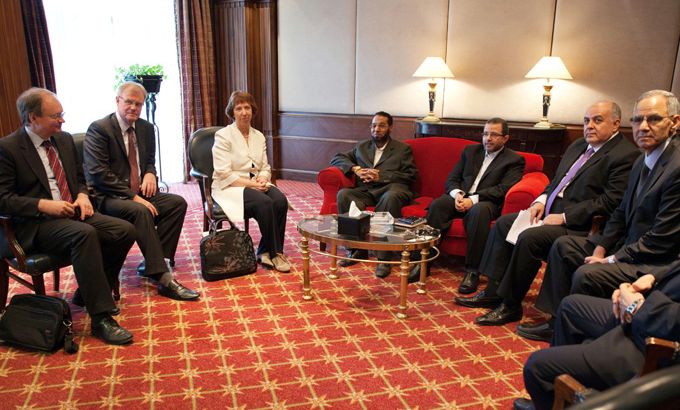EU envoy says Morsi ‘well’ after meeting
Catherine Ashton holds two-hour discussion with former leader, his first known contact with outsiders since his removal.

Catherine Ashton, the European Union foreign policy chief, said Egypt’s deposed president Mohamed Morsi was “well” after meeting him for two hours, his first known contact with the outside world since he was toppled by the army earlier this month.
In a press conference on Tuesday, Ashton said Morsi “has access to information, in terms of TV, newspapers, so we were able to talk about the situation”.
She refused to comment on the substance of their conversation, saying “I told him that I was not going to represent his views”.
Morsi has been held incommunicado since the military had removed him from power on July 3. Early on Wednesday, the state news agency confirmed that a delegation led by former Malian President Alfa Omar Konari also held a one-hour long meeting with the deposed president.
Egypt’s authorities say Morsi is being investigated for charges including murder, stemming from a 2011 jailbreak when he escaped detention during the revolution that toppled longtime president Hosni Mubarak.
Later on Tuesday, speaking alongside interim vice president Mohamed El Baradei, Ashton said EU diplomats would be in Egypt to continue efforts to mediate an end to the crisis.
“I will come back,” she said, adding it was up to Egyptian politicians to “make the right decisions”.
El Baradei said he was optimistic sit-ins by the Muslim Brotherhood, which is protesting against the army’s overthrow of President Mohamed Morsi could be ended peacefully.
“Once we contain the violence that is taking place, then there will be room for a peaceful way to disband the demonstrations in different parts of the country and go into a serious dialogue,” he said.
The political turmoil has divided Egypt, with hundreds of thousands taking to the streets in rival rallies for and against military rule. Tension increased further after scores were killed at a rally in support of Morsi in Cairo on Saturday.
Protesters warned
Monday’s meeting with Ashton came as Morsi’s supporters marched towards security headquarters in Cairo, despite a warning from the National Defence Council that it would take “decisive and firm action” against demonstrators if they went beyond their right to peaceful protest.
The marches began after supporters of Morsi broke their Ramadan fast. Groups moved from their key sit-in site by the Rabaa al-Adawiya mosque in Cairo towards the interior ministry and two other security forces buildings.
Thousands of demonstrators, men and women, chanted slogans against army chief General Abdel Fattah El Sisi.
Earlier, the Anti-Coup Alliance of groups protesting against Morsi’s removal also called for a massive turnout for demonstrations on Tuesday.
They urged Egyptians “to go out into the streets and squares, to regain their freedom and dignity – that are being usurped by the bloody coup – and for the rights of the martyrs assassinated by its bullets”.
Ashton also met El Sisi, interim president, Adly Mansour, and representatives of the pro-Morsi coalition.
“There were no initiatives presented by Ashton or us, she just heard updates on the situation since her last visit,” said Mohamed Ali Bishr, a pro-Morsi delegation member.
The bloodshed in the Arab world’s most populous nation has caused mounting international concern, and Washington on Monday “strongly” condemned the violence.
A group of Egyptian NGOs issued a statement on Monday calling for the Interior Minister Mohamed Ibrahim to be sacked for what it called Saturday’s “massacre”.
A crackdown on Morsi supporters continued on Monday, with the arrest of the president and vice president of the moderate Islamist Wasat party, which has protested against Morsi’s removal.